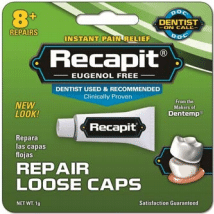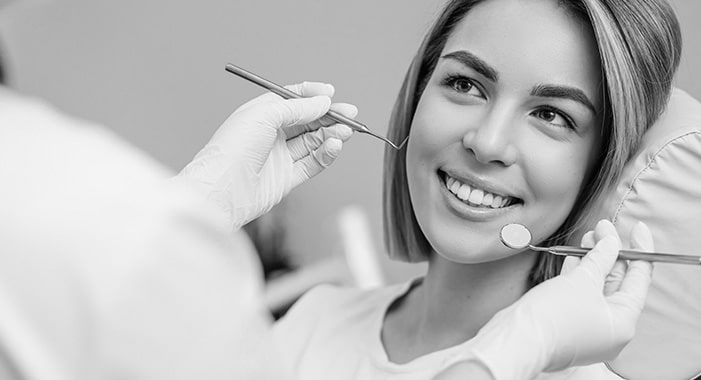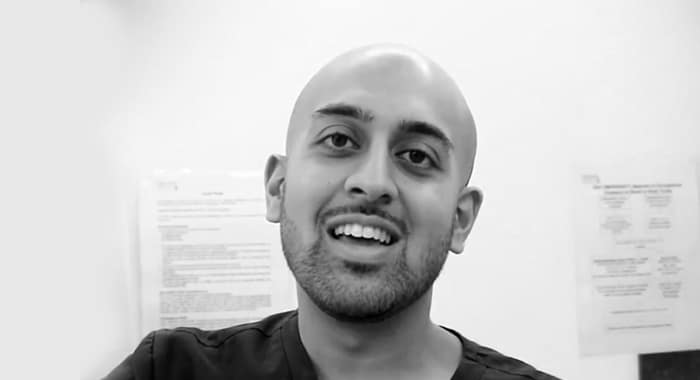For emergency advice please call 01277500332 or email info@dentalkind.com.
What counts as a dental emergency?
Urgent dental treatment:
- Facial swelling extending to eye or neck.
- Bleeding following an extraction that does not stop after 20 mins solid pressure with a gauze/clean hankie. A small amount of oozing is normal, just like if you had grazed your knee.
- Bleeding due to trauma.
- Tooth broken and causing pain, or tooth fallen out.
- Significant toothache preventing sleep, eating, associated with significant swelling, or fever that cannot be managed with painkillers.
Straight to A&E:
- Facial swelling affecting vision or breathing, preventing mouth opening more than 2 fingers width.
- Trauma causing loss of consciousness, double vision or vomiting.
Non-Urgent (may need to wait):
- Loose or lost crowns, bridges or veneers.
- Broken, rubbing or loose dentures.
- Bleeding gums.
- Broken, loose or lost fillings.
- Chipped teeth with no pain.
- Loose orthodontic wires.
Managing Toothache with Painkillers
Anti-inflammatories (like ibuprofen) can help reduce sensitivity from teeth. Combining paracetamol and ibuprofen has also been shown to be effective.
There is currently no strong evidence that drugs like ibuprofen can make COVID-19 worse.
If you have no coronavirus symptoms carry on taking ibuprofen as normal.
So until we have more information, take paracetamol to treat symptoms of coronavirus, unless your doctor has told you paracetamol is not suitable for you. (Updated: 20 March 2020)
Painkillers should always be taken in accordance with instructions on the packet. Taking too many tablets, or taking medications incorrectly will not improve your symptoms, and can cause serious stomach and liver injury which can be life threatening.
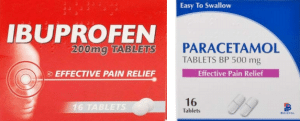
Sensitive Teeth
If the tooth is extremely sensitive to hot or cold, antibiotics will not help.
These home measures may help make symptoms manageable until care can be accessed.
Good cleaning with fluoride toothpaste and reducing sugar intake will help stop any decay from getting any worse.
If there is a hole in the tooth, or a tooth has cracked and is now sensitive/sharp, a temporary filling can be packed into the space. These are widely available from supermarkets and pharmacies e.g dentemp or refilit
Desensitising/sensitive toothpaste (like sensodyne repair and protect or colgate sensitive pro relief) can help. Rub toothpaste directly on the affected area and do not rinse afterwards.
Wisdom Teeth
Wisdom tooth pain is usually due to inflammation of the gum over the erupting tooth, which can be worsened by trauma from biting.
Most flare ups can be managed with good home care and should settle in a few days to a week:
Excellent cleaning (even if it is painful to brush, the area must be kept clean to encourage healing)

Corsodyl mouthwash (avoid use for >1week as may cause staining)
Soft diet (soft food will reduce trauma from biting)
Painkillers (ibuprofen or paracetamol following packet instructions)
Warm salty mouthwash
If you have difficulty swallowing, swelling in your face or cheek or difficulty opening your mouth, call your dentist. You may need antibiotics if the infection is spreading.
Ulcers
Although painful, most ulcers will heal within 7-10 days. Non-healing ulcers/oral lesions present for more than 3 weeks should be assessed by a dentist or doctor.
Warm salty mouthwash
Excellent cleaning (even if it is painful to brush, the mouth must be kept clean to encourage healing and prevent more ulcers forming. Be gentle and use a soft/baby toothbrush).
Difflam (Benzydamine) spray or mouthwash as needed.
Soft diet (soft food will reduce trauma from biting)
Painkillers (ibuprofen or paracetamol following packet instructions)
Rubbing Dentures (Denture adhesives like fixodent may help secure a loose denture. Any sharp edges can be removed using an emery board. Remove dentures when possible if causing trauma.)
Corsodyl mouthwash (avoid use for over 1 week as may cause staining)
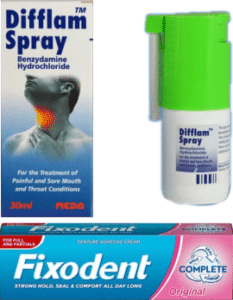
Pain or bleeding after an extraction.
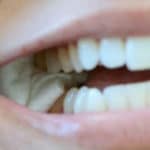
Continue to take regular painkillers for several days after extraction, it is normal for the pain to be at its worst at day 3-4.
We cannot provide antibiotics for pain after extractions unless infection is present. We also cannot prescribe antibiotics over the phone without seeing you in person.
Some pink spit/oozing is normal after an extraction, but if the socket is bleeding freely, bite hard on gauze or a clean hankie for 20 minutes. If bleeding has not stopped, call your dentist.
If you smoke or rinse too soon after an extraction, you risk a dry socket. This can be very painful and regular painkillers are unlikely to be effective. You should call your dentist for advice. Antibiotics will not solve this, as a dressing is needed to cover the exposed bone.
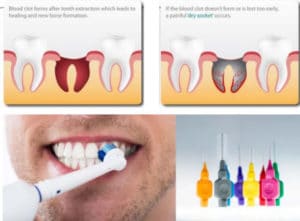
Bleeding Gums
Bleeding from gums is NOT a dental emergency. Bleeding gums are usually due to gum disease and will not stop until brushing improves. Brush twice a day with fluoride toothpaste for 2 minutes, concentrating especially on the areas that are bleeding. Use floss or te-pe brushes to clean between your teeth every day.
If you smoke or rinse too soon after an extraction, you risk a dry socket. This can be very painful and regular painkillers are unlikely to be effective. You should call your dentist for advice.
Lost Crown
- Clean and check the crown. If the crown is mostly hollow, you can attempt to re-cement it at home if you feel confident to do so.
- Remove any debris from the crown, you can use something like the tip of a paperclip to scrape the old cement away. Clean your tooth thoroughly. All debris must be removed from both the crown and the tooth for it to seat properly.
- Check the crown fits without cement. Check that the bite feels correct, if the tooth feels too tall, it is not fitted correctly, double check for debris. NEVER force a crown or post onto or into your tooth, this can cause the root to fracture. If you cannot get the crown to fit, keep the tooth as clean as possible and wait to see your dentist.
- Crowns should be replaced using a dental cement from a pharmacy like Recapit. DO NOT USE SUPERGLUE or FIXADENT to fit your crown.
- Once you are have practiced placing the crown, dry the tooth and crown, mix the cement as instructed on the packet and fill the crown. Place the crown directly onto the tooth. Bite firmly to press it into place.
- Remove any extra cement with a toothpick and floss between your teeth to make sure they do not stick together.
